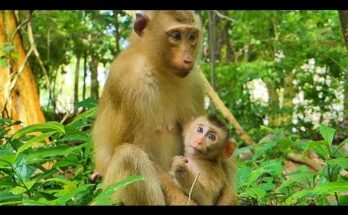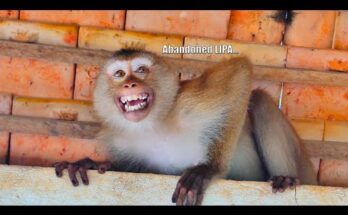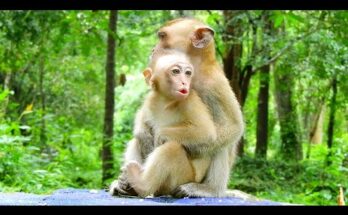The sun had barely risen when the rescue team from a local wildlife NGO carefully carried a small, fragile baby monkey back into the forest. His name was Kimo—a tiny macaque who had once clung to his mother with such innocence and trust. A week earlier, Kimo had suffered a terrible injury after falling from a tree during a scuffle within the troop. The fall left him with a broken arm and internal bruising. His mother, in panic and confusion, had fled the scene with the troop, leaving the baby behind.
When the rescue team found him lying under the branches, barely breathing, they knew every second counted. Kimo was taken to the NGO’s clinic, where he received immediate medical attention. Day and night, the caretakers stayed by his side. They treated his wounds, fed him with formula, and provided warmth with soft blankets and gentle touches. Slowly but surely, the baby monkey regained his strength.
But as his body healed, a new question loomed over the rescuers: Would his mother accept him again?
After seven days of recovery, Kimo was strong enough to return. The team brought him back to the edge of the forest where his troop, including his mother, had last been spotted. With cautious hope, they placed him on a low branch and stepped back, watching silently.
Kimo’s mother, Maia, appeared from the trees. At first, she looked confused. Her head tilted, eyes narrowing. She sniffed the air and climbed closer. Kimo recognized her instantly—his body trembled with excitement, his tiny hands reaching out, calling in soft chirps. But Maia hesitated.
Something about him was different now. His scent had changed. The time apart, combined with the human touch and strange smells of medicine, confused her instincts. She reached out briefly, then pulled away, baring her teeth with uncertainty.
Kimo tried to crawl toward her, but Maia slapped the branch, a warning not to come closer. The rescuers watched with heavy hearts as the moment they had hoped for slipped away. Maia turned and climbed back to the higher trees, her gaze lingering for a moment before she disappeared.
Kimo cried out, his voice echoing through the forest. His mother was gone. Again.
The rescuers gently picked him up, tears in their eyes. Though his body had healed, his spirit now carried a fresh wound—one of rejection.
Back at the sanctuary, Kimo was introduced to other young, orphaned monkeys. Slowly, he began forming bonds. A young female named Suma became his closest companion, and the two were rarely apart. Though his mother had not accepted him back, Kimo found a new family among the rescued—a second chance at love, friendship, and safety.
Kimo’s story became a powerful reminder to the NGO and to everyone who heard it: that the emotional world of animals is as complex and fragile as our own—and that every act of rescue, no matter the outcome, is a chance to help them heal.



